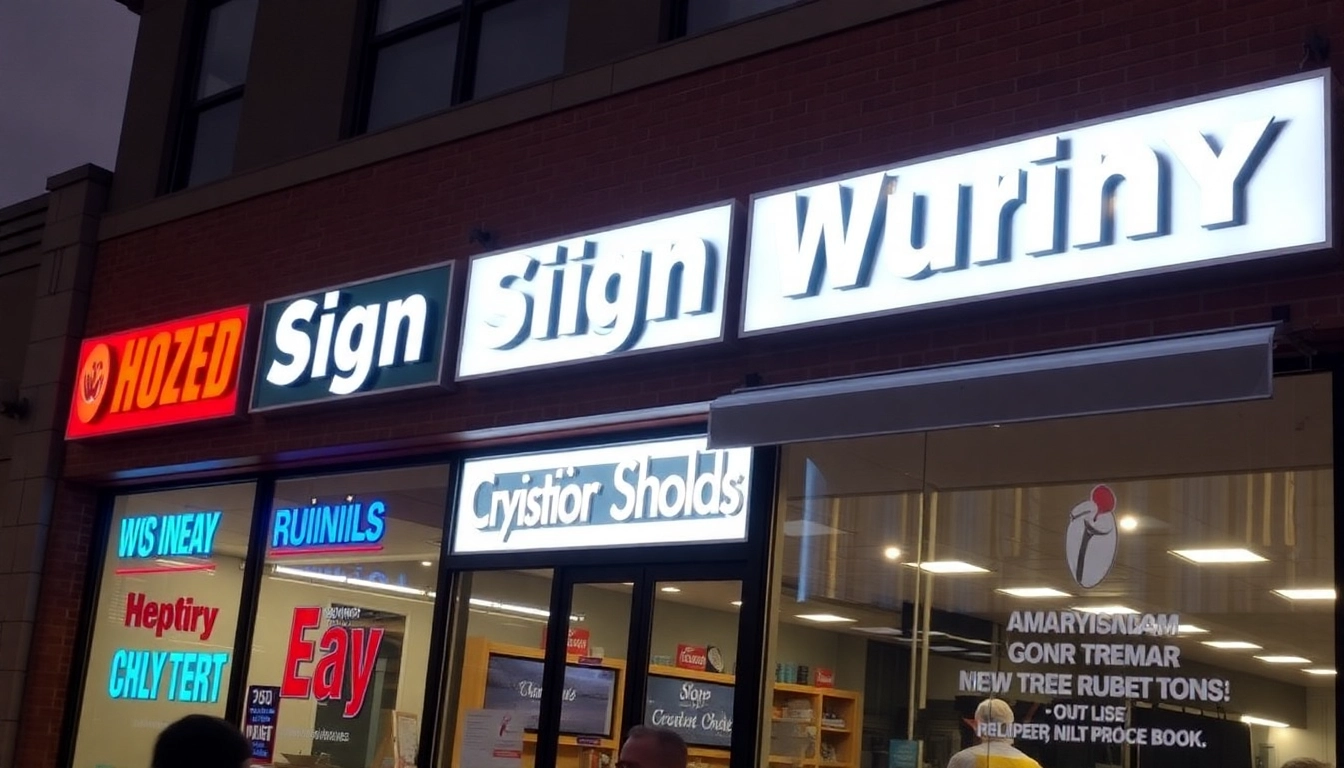Understanding the Role of a Sign Company in Louisville
In the vibrant business landscape of Louisville, standing out amidst local competitors is critical for success. An essential partner in this endeavor is a reputable sign company in Louisville. Such companies specialize in designing, manufacturing, and installing signage that captures attention, communicates brand identity, and effectively attracts customers. The significance of these services extends beyond mere aesthetics; they are integral to establishing a strong local presence and fostering business growth.
Services Offered by Louisville Sign Companies
Louisville sign companies provide a comprehensive array of services tailored to meet the diverse needs of businesses. These include custom storefront signs, digital displays, vehicle wraps, banners, trade show signage, and wayfinding systems. Each service is crafted with attention to detail, ensuring that the signs align with the company’s branding and strategic goals. Modern sign companies leverage advanced technologies like LED lighting, 3D lettering, and interactive displays to create dynamic signage solutions that adapt to evolving market trends.
Importance of Custom Signs for Local Businesses
Custom signs serve as powerful marketing tools that reflect a company’s unique personality and value proposition. They create immediate visual impact, foster brand recognition, and influence customer perceptions. For local businesses in Louisville, well-designed signage enhances visibility in high-traffic areas, distinguishes brands from competitors, and helps establish trust within the community. Moreover, custom signs can be tailored to specific locations, customer demographics, and seasonal promotions, making them versatile assets in a business’s marketing arsenal.
Choosing the Right Sign Company in Louisville
Selecting a dependable sign company requires careful consideration of several factors. Experienced companies bring creative expertise, technical proficiency, and a thorough understanding of local regulations. It’s essential to review their portfolio, client testimonials, and industry reputation. A good sign partner will offer transparent pricing, comprehensive consultation, and support throughout the process—from conceptual design to installation. Ensuring they stay current with Louisville’s sign ordinances and best practices guarantees compliance and long-term satisfaction.
Designing Effective Signs for Your Business
Creative Concepts and Branding Alignment
An effective sign begins with a compelling concept that resonates with your target audience. Creative design should echo your brand’s identity—incorporating logos, color schemes, and messaging that reinforce your business’s core values. Collaborating with a professional sign designer ensures your signage is not only visually appealing but also strategically aligned with your branding goals. For instance, using bold fonts for a retail store or sleek, modern aesthetics for a tech company helps communicate your message instantly.
Materials and Durability Considerations
The choice of materials directly impacts a sign’s longevity and appearance. Common options include aluminum, acrylic, vinyl, wood, and plastic composites. For outdoor signage in Louisville, weather-resistant materials such as aluminum with a protective coating are preferred to withstand points of exposure—rain, snow, UV rays, and temperature fluctuations. Additionally, specific materials provide different aesthetic finishes, from matte to glossy, enabling brands to achieve their desired look while ensuring durability over time.
Incorporating Latest Signage Trends in Louisville
Staying current with signage trends allows businesses to stand out. In Louisville, many sign companies are adopting LED lighting for energy efficiency and visual impact, as well as digital signage for dynamic content updates. Creative use of dimensional lettering, ambient lighting, and interactive displays can further enhance engagement. Minimalist designs are gaining popularity, emphasizing clarity and simplicity, which align well with modern branding strategies. Integrating augmented reality or QR codes into signs also offers innovative ways to connect with tech-savvy consumers.
Implementation and Installation Process
Step-by-Step Sign Production Workflow
The journey of creating a sign involves meticulous planning and execution. Initially, the design phase includes conceptual sketches and digital mockups. Once approved, materials are sourced, and production begins in a controlled environment, often utilizing CNC machining, printing, and finishing techniques. Quality control checks ensure precision, color accuracy, and structural integrity before the sign proceeds to transportation and installation.
Scheduling and Installation Best Practices
Effective scheduling minimizes business disruption. Sign companies coordinate closely with clients to determine optimal installation times, often during off-peak hours or weekends. Professional installers adhere to safety standards and ensure proper mounting, wiring, and alignment. Precise measurements and careful handling prevent damage and guarantee a professional look. Post-installation inspection verifies the signage’s stability and functionality.
Compliance with Louisville Sign Ordinances
Louisville, like many municipalities, enforces specific regulations regarding sign size, lighting, placement, and permits. Working with a knowledgeable sign company ensures your signage complies with local laws, avoiding costly fines or removals. They provide guidance on permit applications, zoning restrictions, and safety codes, streamlining the approval process and ensuring your sign remains lawful and effective.
Maximizing Sign Effectiveness for Business Growth
Strategic Placement and Visibility
Placement is key to maximizing visibility and engagement. Signs should be positioned to capture high foot or vehicular traffic, considering sightlines and ambient lighting. Visibility at night can be enhanced with backlit or illuminated signs. Proper placement not only attracts attention but also guides potential customers directly to your premises or promotional areas, increasing foot traffic and conversions.
Integrating Digital and Traditional Signage
An integrated signage approach combines traditional static signs with digital displays. Digital signs offer flexibility for updates, promotions, and interactive content, appealing to modern consumers. Coupled with static signs providing consistent branding, this multimedia strategy creates a compelling visual environment that adapts to market needs and enhances overall brand presence.
Measuring Sign Impact on Customer Engagement
Evaluating signage effectiveness involves tracking metrics like foot traffic, sales increases, and customer feedback. Technologies such as cameras, heat maps, and digital analytics help assess how signs influence behavior. Regularly reviewing performance data enables businesses to refine signage strategies—adjusting placement, content, or design—to optimize return on investment.
Maintaining and Updating Your Business Signs
Routine Maintenance Tips in Louisville
Proper maintenance preserves sign appearance and functionality. Regular cleaning using non-abrasive solutions prevents dirt buildup. Inspect electrical components, lighting, and structural elements periodically for wear or damage. In Louisville’s climate, addressing rust or corrosion early is crucial, especially for metal signs exposed to moisture and temperature swings.
When and How to Update Signage
Signs should be updated when branding evolves, promotional campaigns change, or signs deteriorate. Updating involves repainting, replacing graphics, or installing entirely new signage. A strategic refresh keeps your business looking current and relevant. Scheduled reviews—every 2-3 years—ensure your signage stays aligned with branding and marketing objectives.
Cost-Effective Sign Refresh Strategies
To refresh signs cost-effectively, consider simple updates like applying new vinyl overlays or repainting existing structures. Using modular signage elements allows quick replacements without complete overhauls. Planning seasonal or promotional updates in advance can reduce labor costs and material waste, maximizing the return on your signage investments.

